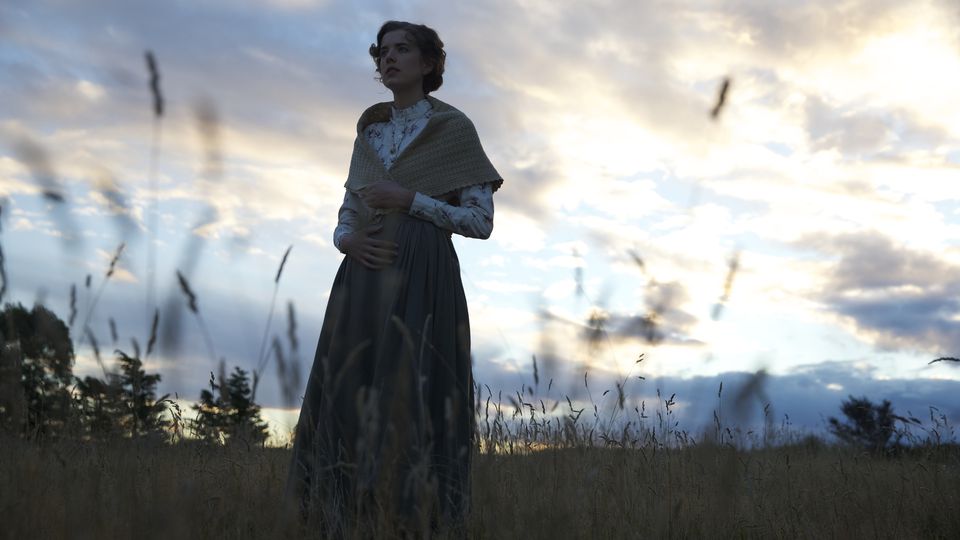MAY 20, 2016
Coming from a place of love (I’m sure), one of the most familiar comments I hear from readers is “Why do you review so many movies I’ve never heard of?” And it’s true, I do. Here’s my dilemma — there’s really not much I want to say about “The Angry Birds Movie.” Sorry. But because I’m lucky enough to live in Los Angeles, I’m able to see some really good movies before they are released around the country. For example, “The Lobster” might be obscure today, but by June it will likely be playing at a theater near you. I’d just like to put those good movies on your radar so when and if they do come to your city, you can sit back and say, “Oh yeah, I already read about that one.”
“Sunset Song,” however, may be a little more challenging than most to track down. It’s currently playing in New York and Los Angeles, but I’m not sure how widely it will be available in the coming weeks. Still, there are two big reasons that I want to bring it to your attention — the first is that “Sunset Song” is not only a very moving film, but visually, it’s breathtakingly beautiful.
The second reason (and this is a personal one): it’s written and directed by Terence Davies, who is, to my mind, the greatest British auteur working in movies today. Davies is a man who directs very few films by choice, and you can feel how much this story means to him in every frame.
“Sunset Song” is based on a novel by Lewis Grassic Gibbon, who’s unfamiliar to me but whose name elicited sighs from the matinee ladies with whom I watched the film. Obviously I haven’t read the novel, but the story fits snugly in the “scrappy heroine” genre of film. Set in a small village in Scotland just before the start of World War I, our heroine is Chris Guthrie (Agyness Deyn), a college student in Scotland who is a language whiz and on track to become a great teacher. Life intrudes, however, in the form of her family. Her father John (Peter Mullan, unsympathetic but effective) is a sadistic brute who regularly belt-whips Chris’ brother Will (Jack Greenlees) and who considers his terrified wife Jean (Daniela Nardini) to be little more than a baby-making machine, even though she is on the far side of middle age.
Death and desertion take its toll on the family until all that’s left is Chris and her father, who suddenly regards Chris not as his daughter but as his property. Chris, who previously had been as scared of her father as her mother had been, decides enough is enough and ends it right there. Now the mistress of the family farm, Chris does her very best to keep it together, but during a severe storm where the farm’s horses are bolting, she is helped by handsome neighbor Ewan (Kevin Guthrie), and you can probably fill in the rest.
With Chris happily married to Ewan, World War I suddenly intrudes, and soon he is fighting the war in France. Left at home with her newborn, Chris, even when things are at their darkest, still walks through the farm’s grain fields with an optimistic view of the life that’s ahead of her.
Though “Sunset Song” is technically in English, there are subtitles throughout, which is initially a little weird. But it is Scottish, so just be grateful.
There’s a lot of plot to get through, and Davies tells it at a pace that can generously be described as leisurely (a critic’s euphemism for slow at times). Nonetheless, the anchor of the film is Deyn, who was a famous model in England, which immediately aroused my suspicions. But no, this model is an actress and a terrific one, as she is challenged with a part that has to carry the film and must convey a range of emotions that would prove to be a test to any Shakespearean-trained actor. And she triumphs.
But the star of a Terence Davies film is always Terence Davies, because his style is so distinctive. The cinematography in a Davies film is usually stunning, and, not to get too film-wonky, Michael McDonough’s work here recalls Nestor Almendros’ Oscar-winning grain-filled cinematography in the 1978 classic “Days of Heaven,” and there’s no higher compliment than that. Davies’ interest is always the lower classes, who somehow persevere, and when they do have a moment of happiness, they usually celebrate with a group song. This is true with his two best films, “Distant Voices, Still Lives” (1988) and, to me, his masterpiece, 1992’s “The Long Day Closes,” which mirrors Davies’ own life as a young gay man who loves movies and has problems with the Roman Catholic Church. (Gee, why would I relate to that?) And that love of music is very true with “Sunset Song.”
The romance novel structure may not be to everyone’s taste, but “Sunset Song” is so darned beautiful that even the most skeptical cynic may melt.
GRADE: B+












